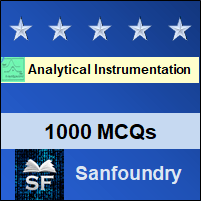
Analytical Instrumentation Multiple Choice Questions Highlights
- 1000+ Multiple Choice Questions & Answers (MCQs) in Analytical Instrumentation with a detailed explanation of every question.- These MCQs cover theoretical concepts, true-false(T/F) statements, fill-in-the-blanks and match the following style statements.
- These MCQs also cover numericals as well as diagram oriented MCQs.
- These MCQs are organized chapterwise and each Chapter is futher organized topicwise.
- Every MCQ set focuses on a specific topic of a given Chapter in Analytical Instrumentation Subject.
Who should Practice Analytical Instrumentation MCQs?
– Students who are preparing for college tests and exams such as mid-term tests and semester tests on Analytical Instrumentation.- Students who are preparing for Online/Offline Tests/Contests in Analytical Instrumentation.
– Students who wish to sharpen their knowledge of Analytical Instrumentation Subject.
- Anyone preparing for Aptitude test in Analytical Instrumentation.
- Anyone preparing for interviews (campus/off-campus interviews, walk-in interview and company interviews).
- Anyone preparing for entrance examinations and other competitive examinations.
- All - Experienced, Freshers and College / School Students.
Analytical Instrumentation Chapters
Here's the list of chapters on the "Analytical Instrumentation" subject covering 100+ topics. You can practice the MCQs chapter by chapter starting from the 1st chapter or you can jump to any chapter of your choice.- Colorimetry and Spectrometry
- Chromatography
- Industrial Gas Analysers
- Pollution Monitoring Instruments
- pH Meters and Ion Analysers
- Dissolved Component Analysers
- Radiochemical Techniques
- X-Ray Spectrometers
- Nuclear Magnetic Resonance Spectrometer
- Mass Spectrometer
- Electron and Ion Spectrometers
- Electron Spin Resonance Spectrometers
- Digital Circuits
1. Colorimetry and Spectrometry
The section contains multiple choice questions and answers on spectral method of analysis, uv visible spectrometers, single beam and double beam instruments, absorption instrumentation, fourier transform infra red spectrometers, instrumentation of ir, atomic absorption spectrometer and flame emission photometers.
2. Chromatography
The section contains questions and answers on introduction and operations of chromatography, column efficiency and column resolution, gas chromatography and gas solid chromatography, high pressure liquid chromatography and amino acid analysers.
3. Industrial Gas Analysers
The section contains MCQs on no2, h2s and infra red analysers, magnetic wind instruments, paramagnetic oxygen analysers, gas density and ionization of gases.
4. Pollution Monitoring Instruments
The section contains multiple choice questions and answers on sulphur di-oxide monitoring, estimation of nitrogen oxides, carbon monoxide and hydrocarbons.
|
|
|
5. pH Meters and Ion Analysers
The section contains questions and answers on ph measurment and types, combination, hydrogen and glass electrodes, ph meters, ammonia and fluoride electrodes, ion analyser and biosensors.
6. Dissolved Component Analysers
The section contains MCQs on dissolved oxygen analyser, sodium and silica analyser.
|
|
|
7. Radiochemical Techniques
The section contains multiple choice questions and answers on fundamentals of radiochemical methods, radiation detectors, gamma camera, liquid scintillation counters and pulse height analyser.
|
|
|
8. X-Ray Spectrometers
The section contains questions and answers on instrumentation of x-Ray spectroscopy and diffractometers, x-ray absorption meter, x-ray fluorescene spectrometer and electron probe microanalyser.
9. Nuclear Magnetic Resonance Spectrometer
The section contains MCQs on types of nmr spectrometer, continous wave nmr spectrometer, principles of nuclear magnetic resonance and fourier transform nmr spectroscopy.
|
|
|
10. Mass Spectrometer
The section contains multiple choice questions and answers on components and principles of mass spectrometer, radio frequency and quadrupole mass spectrometer, ion transducers, gas and liquid mass spectrometer, magnetic deflection of mass spectrometer and tandem mass spectroscopy.
11. Electron and Ion Spectrometers
The section contains questions and answers on surface spectroscopic techniques, instrumentation of ion and electron spectroscopy, auger electron spectroscopy and electron spectroscopy for chemical analysis.
|
|
|
12. Electron Spin Resonance Spectrometers
The section contains MCQs on electron spin resonance and basic and instrumentation of esr spectrometer.
|
|
|
13. Digital Circuits
The section contains multiple choice questions and answers on digital circuits and logic families.
|
|
|
Wish you the best in your endeavor to learn and master Analytical Instrumentation!
